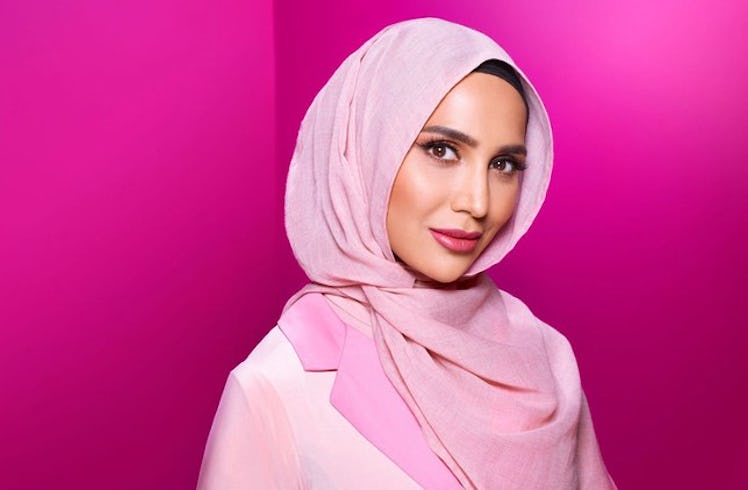
L'Oreal Paris Just Dropped The First Hair Campaign Featuring A Hijab & I'm So Here For It
I love everything about a good hair campaign, especially when a celeb changes up their look or experiments with an over-the-top style. But when I saw the new L'Oreal Paris hijab hair campaign, I was totally stunned. Full stop. The brand just dropped a campaign featuring Amena Khan, the first Muslim, hijab-wearing model in a mainstream hair ad. And while the revolution will not be televised (for now), it will be shared across all social media platforms, my friends.
UPDATE: Amena Khan announced on Jan. 22 that she has backed out of the L'Oreal Paris hijab hair campaign due to previous "anti-Israel" comments she tweeted in 2014. "With deep regret, I've decided to step down from this campaign because the current conversations surrounding it detract from the positive inclusive sentiment that it set out to deliver," she wrote on Instagram.
EARLIER: Hijab wearing women, aka hijabis, have many misconceptions placed upon them. A common one is people mistakenly believing that because hijabis choose to cover their hair in public, they don't take care of it or enjoy it for themselves. The not-so-shocking truth is that just like many women all across the world, women that choose to wear the hijab want healthy, shiny hair, too. Whether it's the cold winter months, or the brutal humid summer months, the mood-boost of a Good Hair Day crosses across many cultures.
Khan is a British beauty blogger, model, and the co-founder of Ardere Cosmetics. Not only is she gorgeous and a lover of modest fashion, but she also starred in L'Oréal's 2017 collaboration with The Prince Trust. Her resume is stacked, but I'm super proud to see that she was cast as the first hijab-wearing model in a hair campaign.
Khan has worn the hijab since her 20s, but even before she made the choice to wear a hijab, she never saw anyone she could relate to in the media. A campaign like this is not only major for the brand, but it shows women who wear the hijab (and even those that don't) that haircare is about more than just what your hair looks like to other people, it's about how it makes you feel. With this campaign, L’Oréal is showcasing that the voices women were blessed with are just as important.
For all women, not only those who wear the hijab, self-care can and does extend beyond the superficial. In an interview with Vogue UK, Khan expressed how significant it is that she was given this platform. Khan believes the mindset that we only fix our hair for other people "strips us of our autonomy and our sense of independence."
How many brands are doing things like this? Not many. They’re literally putting a girl in a headscarf — whose hair you can’t see — in a hair campaign. Because what they’re really valuing through the campaign is the voices that we have. You have to wonder—why is it presumed that women who don’t show their hair don’t look after it? The opposite of that would be that everyone that does show their hair only looks after it for the sake of showing it to others.
I've been into fashion and beauty since I was a little girl, but it seems like recently the beauty industry is finally making the necessary strides to become more diverse. It's important to note though, that it's not enough for brands to profit from using images of people of color. They actually have to support the people they're representing in these campaigns that promote empowerment.
Khan is a part of the new L'Oréal Paris Elvive World of Care Campaign. In this campaign she will be promoting Elvive, a product line that nourishes damaged hair. In this new Elvive multimedia campaign, Khan joins a diverse line up of women (and men) to promote the message that people are "Worth It." Over the last couple of years, L’Oréal Paris has stretched its “Worth It” slogan beyond just supermodels, so that real people see could themselves in the positive affirmation.
I think it's so important that a major brand like L’Oréal Paris is stepping up to the plate to increase diversity in media. The world is at a pivotal moment where brands are either going to get with the times or be called out for their lack of representation.